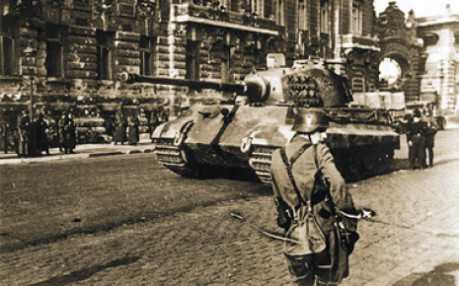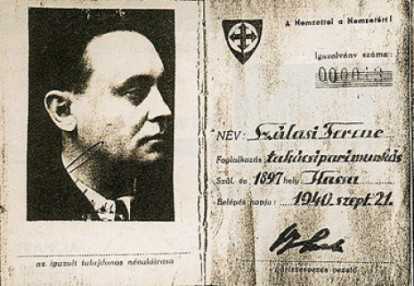Horthy’s Exit Attempt and the Arrow Cross’ Seizure of Power – 15 October 1944
Szöveg: hungariandefence.com | 2011. október 15. 6:1415 October 1944 went down in Hungarian history as the day of Regent Miklós Horthy’s unsuccessful exit attempt. We commemorate the historic event that took place 67 years ago by excerpting from the book “For the Homeland Unto Death – 1100 years” published by Zrínyi Média, which is available in our Digital Library.
Sensing the deterioration of the military
situation, Horthy consulted with his
ministers and with the Chief of the Honvéd
General Staff János Vörös on 6 September. He
called them in again on the 7th, together with
Gyula Ambrózy, Head of the Cabinet Office,
and Lt.-Gen. Antal Vattay, Head of the Military
Office; and then at the Crown Council in the
evening he declared that it had become necessary
to seek a ceasefire. From then on, consultations
followed on day by day. From mid-September, the
“Exit Office" was coordinated by Miklós Horthy
Jr. Ambrózy was responsible for the civilian side,
and Vattay for the military.
At Horthy’s request, Gen. (Ret.) István Náday
flew to the Allies’ Italian headquarters in Caserta
on 22 September. General Maitland Wilson told
him that only unconditional surrender would be
acceptable. On the 24th, Horthy arranged for an
official delegation to be sent to the Soviet Union
led by Gen. Gábor Faragho, which arrived in
Moscow on 1 October.

this, decided on another armed operation. On
2 October, Ambassador Plenipotentiary Veesenmayer
informed Ferenc Szálasi, leader of the
Arrow Cross Party–Hungarist Movement that
Hitler had decided to put him in charge of the
country. Veesenmayer also wanted to make sure
that the newly formed government have the
support of other political forces in addition to
the Arrow Cross Party. He made contact with
Imrédy’s Hungarian Renewal Party and the
Hungarian National Socialist Party.
Molotov, the Soviet Foreign Minister, handed
over the Soviet ceasefire terms on the night of
8 October, and Faragho forwarded these to Budapest
by telegram on the evening of the 9th
These stipulated that Hungary must withdraw
its administration and military forces to within
the 31 December 1937 borders within ten days,
declare war on Germany, to the success of
which the Soviet Union would provide military
assistance to Hungary, and receive an Allied
supervisory commission. If these terms were
accepted, the Allies would be prepared to sign a
ceasefire agreement.
After Horthy’s response on 10 October, Faragho
signed the preliminary ceasefire terms on the
evening of 11 October 1944. Churchill, who was
in Moscow, gave his consent for talks on the 13th.
American consent came by telegram on the 14th.
The failure of the exit attempt and the rightwing
seizure of power created a new situation. The
Lakatos government and the Honvéd General
Staff did not give Horthy and his inner circle
sufficient support. There was little Hungarian
military force in Budapest. Since the military
command was to be by-passed, only Lt.-Gen.
Károly Lázár, commander of the Bodyguard, was
available to coordinate what forces there were. He
had at his disposal 2000 soldiers, the same number
of police, five police armoured cars and 6 tanks.
Against this stood 30+ King Tiger tanks of the
German 503rd Heavy Armoured Division, which
had 25,000 men on strength, even without Arrow
Cross support. These were impossible odds.
Horthy did not inform the chief of the Honvéd
General Staff or the army commanders or the
leaders of the Hungarian Front about when he
was going to declare the ceasefire. This made it
impossible for the generals to take any definite
action, and precluded any action by the organised
Social Democratic workers in Budapest.
On the day of the exit attempt, 15 October
1944, Horthy announced to the Crown Council at
10.30 am that he was requesting a ceasefire. Subsequently
he read out his proclamation on the
radio. This was how most political and military
leaders found out about the exit attempt. They
did not know what to make of what they heard.
The government passively awaited events, and
Horthy also withdrew, not involving himself in
directing events.

arrested some of the military, gendarme and
police commanders in Budapest and took control
of the strategic points. Only the 300-strong
Bodyguard made any armed resistance. At 4.15
pm it was the turn of the Arrow Cross to make
their appeal; after 5 pm they announced the
command of the chief of the General Staff to
continue fighting, and at 9.40 pm Ferenc Szálasi’s
declaration of seizure of power.
On the afternoon of 16 October, now in
German custody, Horthy signed a statement
rescinding his proclamation, and in the evening
he signed his resignation, which included the
appointment of Szálasi as prime minister. Under
German pressure, other parties were also included
in the government which was formed on the 16th.
General Károly Beregfy took over the Ministry of
Defence and the Honvéd General Staff. On the
27th, the National Council united the functions of
head of state and head of government. Szálasi
took the oath as national leader of the Hungarist
Work State, on 2 November.
Struggling to gain power, Szálasi was in
fact no more than Hitler’s vassal. The national
policy offices of the “Nation Leader’s Task
Force" and the government offices of the State
Military Command were intended to take over
the continued functioning of the ministries.
Power was nominally total; practically chaotic.
To quote the German General Otto Wöhler who
directed the military operations in Hungary after
Christmas 1944: “everybody wanted to govern, as
a result nobody governed."
After the seizure of power, the Arrow
Cross party militia, set up in 1938 and used for
keeping order on the streets, became a security
organisation, the Armed Party Service. That, and
several other organisations set up after the seizure
of power (Armed Nation Service, National
Reckoning Organisation, National Reckoning
Office, Military Security Service), perpetrated acts
of terror. Many of Jews remaining in Budapest
were shot into the Danube, and nobody else was
secure against the lawless terror of the armed
Arrow Cross squads.